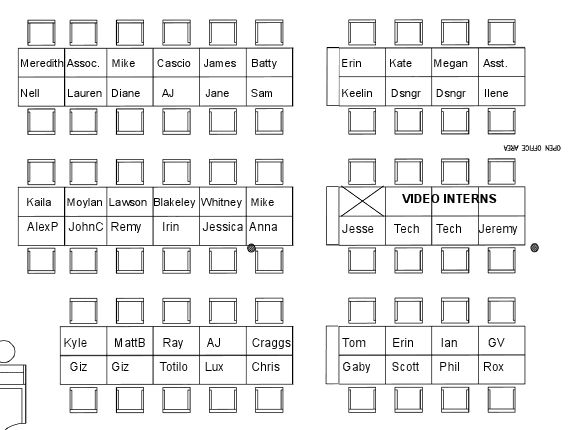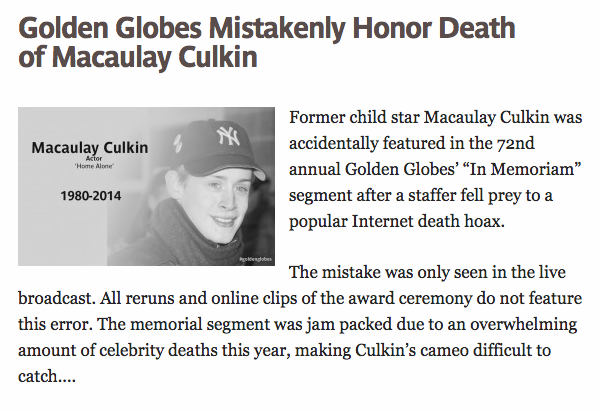Process Grueling
What is it like to be a startup that venture capitalists have determined is worth at least a billion dollars?
Jyoti Bansal, CEO, AppDynamics: “It’s not like winning the lottery. There’s not a phone call you get and suddenly you’re a billion-dollar company. It was a process that took several months.”
And one might mistakenly expect that these billion-dollar valuations just happen overnight!
Where Your Favorite Gawker Writer Sits Now

Here is Gawker’s new seating chart, put forward this week, and then promptly and blatantly leaked to us in a very passive fit of nostalgia and reflexive defiance.
Don’t get too attached to it — the company is finally moving out of its oddball, stair-intensive Soho loft building this year.

Here’s a seating chart from 2010, for comparison. Lots of changes!
Back then, Gawker and Jezebel shared a table — behind them, so did Gizmodo and Deadspin.
This old chart also has Gawker’s Alex Pareene sitting next to John Cook. And look how far they’ve come! OH WAIT, no, now they’re sitting next to each other again, ol’ “AP” and “Cook,” just at a different table, one now in deep blue for “management.” How fast they grow up. [UPDATE: Angry sources inside Gawker Media claim that Alex Pareene has never sat in the seat marked AP which is clearly his seat. When will Alex Pareene sit down like an important white man? Guess he shouldn’t have dropped out of school.]
What else?
1. What’s most notable is that the real top honchos — Heather Dietrick and Nick Denton — have moved themselves downstairs, with the luxury class ad sales team and tech folks. That leaves Tommy Craggs as the top honcho on the floor. That’s a bit like leaving the zoo in the hands of the reptile house manager. I literally have no idea what that means!!! Honestly I bet it’s really relaxing having Nick off the editorial floor. Maybe people actually speak out loud in the office now.
2. There are sixteen Gawker seats. Isn’t that great? Wow, that’s huge. Can you name more than five Gawker writers? (JK, they have something called “editing” now, it’s crazy.)
2.5 Why do Caity and Hamilton have to sit in the seats by the bathroom where you always know when someone just took a huge unhealthy dump? (Glares at Deadspin.)
3. When we last checked in on Gawker’s seating chart, back in 2010, there was a whole desk of “video interns.” What was a “video intern”? That information is lost to history.
3.5 Ugh, the Jezebel table is so fun now.
4. Why does “management” (described by Nick Denton as “Tommy Cragg’s gerontocracy”) have to sit facing Jalopnik, of all terrible sights? (I SAID “SIGHTS.”) Can’t management move themselves into the lounge behind the bathrooms, or to some nice room on the third floor with the people who actually run the company?
4.5 Speaking of power… When Gawker employee Jason Parham wrote recently about the importance of diversity at Gawker, one of the only things I disagreed with was that he wrote diversity was important across the company but “especially in edit.” I get that he means “public-facing” and “giving voice” to people… but, honestly the day we see a single company have literally any kind of diversity in its ad sales department is the day things start to get better for real. That’s where the money, advancement, and power is too! Being a writer is just a trick to keep us all poor and powerless. We should all be rushing the business jobs.
5. Speaking of money, power and diversity… where does new Valleywag writer Dan Lyons sit when he comes to town? Is there someplace in some corner where everyone can throw trash at him for being so terrible?
Toro Y Moi, "Empty Nesters"
A sunny preview of an album that should arrive just in time for the thaw. (Via Dan.)
Top Ten Oscar-Worthy Sigourney Weaver Performances, In Order
10. Alien 3
9. Dave
8. Gorillas in the Mist
7. Cabin in the Woods
6. Alien
5. The Ice Storm
4. Aliens
3. Death and the Maiden
2. Working Girl
1. Copycat
New York City, January 20, 2015

★★★★ The brightness of the morning overflowed the edges of the blinds. A loose sheet of high clouds came apart into individual cloudlets, and those bits of clouds went to blue. The polished metal of the pen cast triple rings on the notebook page. Everything was clean and articulated, the daylight wide-open and generous. In the slow-moving crowd up the subway stairs on Grand, there was time to take in the texture of the zigzag metalwork and the pale ashlike flecks of debris blowing by. Outside a bakery a man down on his luck was asking passersby, quite reasonably, for a cup of coffee. And a bun, or two, why not. A brassy eagle gleamed on the door of the bank. The afternoon clouded over, but even in the night the air was still clear, the stoplights receding, apartment balconies catching the light of the street on their undersides all the way up.
Pharmacy
A man walks into a pharmacy. It’s a new business, having just opened its doors in a building on the corner of his street three months ago. He has been in the store at least once or twice a week since then. The man has cancer. He takes a lot of medicine.
He walks up to the counter and the pharmacist greets him with a smile.
“Hi,” the pharmacist says, and swivels on his swivel chair to look over his shoulder at the bags of filled prescriptions hanging on a rack behind him. “Do we have something waiting for you?”
“No,” the man says, pulling a piece of paper from his pocket, “I need to get this one filled.”
“Oh, sorry,” the pharmacist says. “It’s just that I’ve been seeing you so often!”
The man knows that he is a particularly valuable customer. This does not make him particularly happy, considering all the implications behind the fact. So he finds this apology falls short in its scope.
You’d think, he thinks, that a pharmacist would know.
(Previously.)
Narrative Secured

For those unfamiliar with the phenomenon, a Megyn moment, as I have taken to calling it, is when you, a Fox guest — maybe a regular guest or even an official contributor — are pursuing a line of argument that seems perfectly congruent with the Fox worldview, only to have Kelly seize on some part of it and call it out as nonsense, maybe even turn it back on you. You don’t always know when, how or even if the Megyn moment will happen; Kelly’s political sensibility and choice of subjects are generally in keeping with that of the network at large. But you always have to be ready for it, no matter who you are. Neither Karl Rove nor Dick Cheney have been spared their Megyn moments, nor will the growing field of 2016 presidential aspirants, who can look forward to two years of interrogation on “The Kelly File.” The Megyn moment has upended the popular notion of how a Fox News star is supposed to behave, and led to the spectacle of a Fox anchor winning praise from the very elites whose disdain Fox has always welcomed.
Or: Megyn Kelly exists on Fox News as a false assurance to viewers that what they are getting is not, in fact, monolithic and prescribed; that the people they depend on to momentarily jolt them out of the deep torpor induced by the overall Fox News programming ethos, which is expressly intended to induce despair in its aging audience, are not simply following a cynical script between car-service rides in and out of Manhattan (which, if you’re ever near News Corp’s building on Avenue of the Americas, is a worthwhile and striking image to consider: the sensibilities expressed upstairs, to Regular People far away, are meant to sound like common sense; they could not be repeated with any self awareness at lunch a block away on 5th Avenue, or over drinks by the park, ten blocks north, and almost certainly aren’t).
A “Megyn Kelly moment” only gives the impression of evidence and rigor to the viewer’s naturally accumulating feelings of doom and decline. Fox News, the financial and political operation, is a relatively small entity that produces enormous externalities: it alienates its viewers from society — and, if necessary, their families — just enough to keep them watching but not quite so completely as to prevent them from continuing to cast their votes against the darkness.
Engaging with the Nature of Truth

A hoax, according to Facebook, is “a form of News Feed spam.” This can include, but is not limited to “scams (‘Click here to win a lifetime supply of coffee’), or deliberately false or misleading news stories (‘Man sees dinosaur on hike in Utah’).” The problem with these “hoaxes” is not their lack of truth, per se, but that the people who post them sometimes “later decide to delete their original posts,” especially if their friends later comment that their post is a hoax — this makes them “two times more likely to delete these types of posts.” Engagement deleted is engagement wasted; this is the truly terrible thing about hoaxes.
What is a not-hoax then — that is, truth? Truth is that which will be shared and not deleted. Because truth lies in the engagement of the user, Facebook will not remove “stories people report as false” or “review content and mak[e] a determination on its accuracy.” Instead, when users report a story in their Newsfeed as false — or if a story has been deleted enough by its original posters — it will get “reduced distribution in News Feed.” Deletion or injunction against false stories is not possible; Facebook is not an arbiter of truth, and besides, some users might still want to share it.
There is profound truth — extreme engagement — to be found, after all, in some fake news, like “satirical content intended to be humorous” — or better still for Facebook’s News Feed algorithms, “content that is clearly labeled as satire,” like so, even if it is not at all humorous or even intended to be, like The Daily Currant, the web’s largest deeply unfunny purveyor of fake news designed to trick people into sharing it, which, humorously enough I suppose, calls itself a “satirical newspaper.” This content, Facebook promises, “should not be affected by this update,” which is to say, as long as people engage with it.
In the eye of the engager, truth is an asymptote that continuously approaches but never quite crosses the line that would make it an outright lie. Asking whether or not it is strictly true that this dog is “protecting” a soldier while he sleeps is beside the point — which is nine hundred thousand likes and whatever it makes you feel. And that is the truest truth of all: Emotions are always real and identities are immutable. They cannot be falsified, only engaged with.
How To Hate Yourself Less

Psychotherapist Jenise Harmon here offers three steps to help battle self-hatred. Perhaps they might assist you if self-hatred is a thing from which you suffer. If you ask me, most of the problems we face today arise from a general lack of self-hatred on the part of the people who make the decisions, but that is a subject for another lecture. In any event, you can find some tips at the previous link. Not being a psychotherapist myself I cannot say whether or not they are particularly effective as treatment but what I am is a sort of spiritual guide to many of the lost souls who distract themselves with the emptiness of the Internet and over the course of my ministry I have developed a three-step plan of my own which culminates in an important invocation the efficacy of which many of my followers have testified to in both email and tweet. If you’d like to learn from my counsel, read on.
1. Remember that as bad as you think you are, you are probably actually overlooking a bunch of stuff. We all know the obvious flaws in our natures because they are obvious. We even have a fairly good handle on the more-difficult-to-identify problem areas of our personalities, either because we have overheard people talking about us when they think we’ve left the room or we just know from the disappointed glances and shaking of the head that happens whenever we say the idiot things that we can’t keep from coming out of our mouths or we once again fail to meet the basic expectations others reasonably expect of us. But there are plenty of things we do — some of which we actually think of as assets in our otherwise deficit-laden daily interactions with those unfortunate enough to encounter us on a regular basis — that are just as bad, and maybe even worse because we’re proud (or at least not as shame-filled as usual) of them, as our most glaring and detestable traits. So you’re actually not hating yourself enough, which makes sense because you suck so bad that of course you’d fuck up self-loathing too.
2. Realize that every effort you have made to be better has failed and that every effort you attempt in the future will achieve similar results. People don’t change. Change is a lie told by Hollywood and anyone out to make a buck off of your basic desperate need to be loved in spite of your loathsome and repellent qualities. The most wistful word of all is “tomorrow” when it is used in the context of “tomorrow I’m going to be nicer” or “tomorrow I’m going to drink less” or “tomorrow I’m going to be more patient and less hurtful to the people around me who are actually trying to be good to me even though no one deserves it less than I do” or any of the hundred other things you tell yourself will be different the next day but never are because it’s easier to just be a dick and frankly you have been stuck on suck for so long that even trying to shift gears would result in a pain greater than your quotidian suffering over being unloved, since the worst hurt of all comes from confronting just what a useless sack of skin you are and how much space you take up with your irritation and ill-mannered complaining and general worthlessness and knowing that it is impossible for things to be otherwise. People don’t change. Even people who are better than you — and everyone is better than you — have tried to and failed. Why on earth do you think you’d stand a chance? You are who you are, as awful as that is for everyone.
3. Accept your irrelevance. Now that you’ve understood just how hideous your personality is and how disagreeable it is for everyone to be around you or force themselves to feel (in the case of family members) or feign (in the case of “friends”) affection for you, you have come to a place where we can let the healing start. Today I would like to teach you my Affirmation of Insignificance. Please memorize and repeat as needed.
I don’t matter. Nothing does. Everything is terrible and only getting worse but as awful as I am, I am still just a meaningless speck in the giant ocean of ghastliness and atrocity and it is the height of absurdity to assume that even someone as tiresome as I am merits an entry on the list of abominations that plague this world each second of every day. I suck. I’m nothing. I won’t worry too much about myself, because nobody else will, and they’re not wrong. Soon all trace of my sorry existence will disappear from the face of the world and whatever suffering I’ve caused will be as if it never existed and if it mattered one bit there would be great rejoicing but it doesn’t so there won’t. I suck so bad and it doesn’t make a damn bit of difference. I’m the worst, and whatever.
Feel better? You’re welcome. I recommend saying it when you wake up in the morning and right before you go to bed at night, but you will find a routine that works best for you. Good luck! Not that you deserve it, you piece of shit. You’re useless. And that’s okay. Here endeth the lesson.





